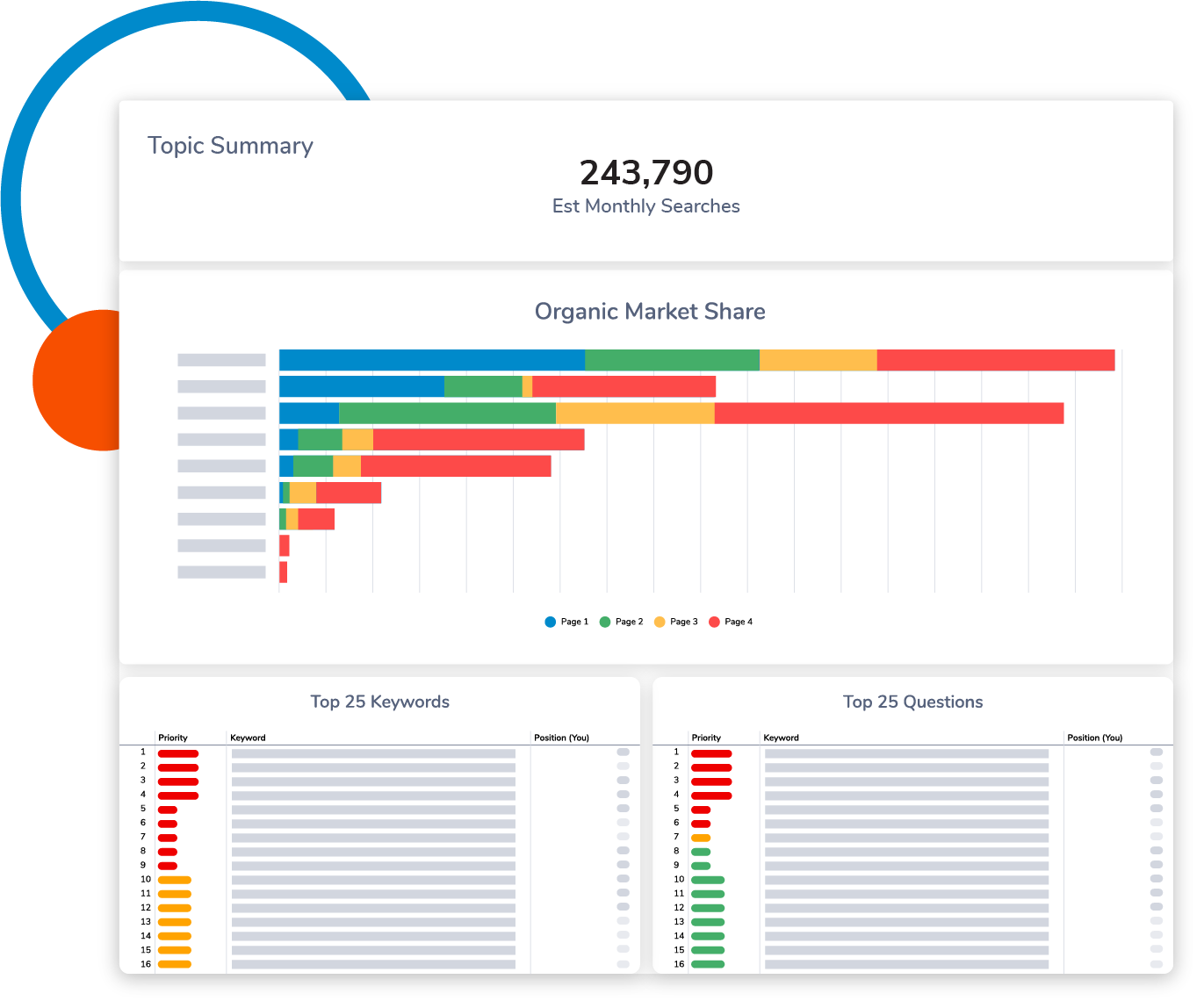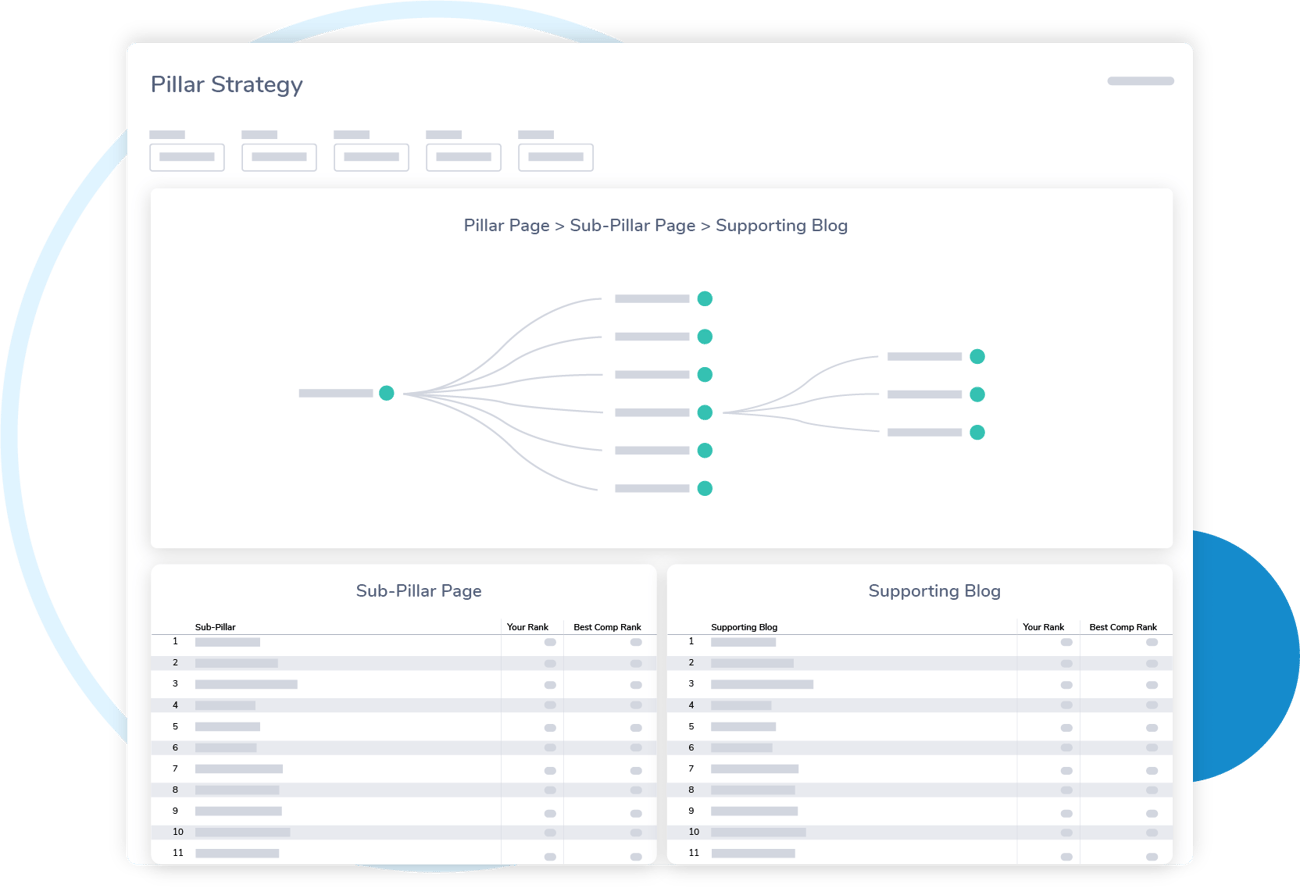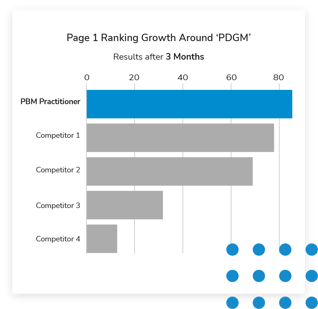You probably see companies frequently sharing different types of content like social media posts, email blasts, or different blogs and writings in search results on Google. How often do you scroll past the first few results or even the first page to see if you can find relevant information to your search? Well, one study found that 28.5% of people searching online clicked the very first result on Google. After that, 15.7% clicked the second result, and 11% clicked the third. That means over 55% of online searchers visit one of the first three results before any others! And over 90% of people don’t move on to the second page of results!
Without strong content marketing, it’s more likely that blogs and other content won’t drive much, if any, traffic because they won’t be seen. That might sound a little harsh, but over 90% of websites don’t get any web traffic at all and content is no exception. Without the right tools and knowledge of marketing, it’s hard to reach an audience. The data is pretty clear, content marketing is the gold standard of digital marketing and it’s not showing any signs of slowing down. In fact, companies employing content marketers see 30% higher growth rate than those that aren’t.
So what does this have to do with starting a career in content marketing? It’s quite simple: content marketing doesn’t work without writers. Writing, research, and strategy skills are in demand more now than ever and a content marketing job will give you the opportunity to generate real growth for your company.
Before you ask, “How do I get a job in content marketing?,” let’s start with the basics. In this piece, we’re going to talk about content marketing, what a career as a content writer looks like, and how to get started.
What Is Content Marketing?
Content marketing is the development of useful and relevant content—such as blogs, newsletters, social media posts, etc.—and distribution of it to reach a target audience. This informative content is interesting to read, watch, or listen to. The goal is to assist the customers, respond to a question, or resolve a problem.
What Is a Content Marketing Job?
Content marketers are tasked with using strong communication and persuasion to organize, produce, and distribute content to an audience with the goal of informing their readership, boosting engagement, and increasing sales conversion. Typically, content marketers aim to produce informational material that is relevant to the business’s industry. While content might be aimed at promoting a product or service, it ultimately forms a bridge between the business and the intended audience.
Here are a few of the job titles you might find in a content marketing career:
- Content writer
- Content / marketing manager
- Marketing analyst
- Marketing coordinator
- Marketing and promotions manager
- Marketing specialist
- Vice president of marketing
- Chief marketing officer
In some situations job titles could mean similar things. For instance, at some companies a content writer might be called a content manager. Or a marketing coordinator might be called a project manager. No matter the title, working in content marketing follows a similar career path.
There are several aspects to what a content marketer does and what makes a great content manager. This list isn’t comprehensive, because content marketing entails a lot of duties, but here are the ones we think are most important:
- Research keywords and phrases: What is gaining traffic on search engines right now? What keywords are competitors using to draw in customers? Understanding what keywords rank the highest in search engine optimization (SEO) is an essential part of content marketing. This ensures that you’re reaching the right audience and ranking at the top of Google searches. As a content marketer, it’s your job to find the right keywords and trends to ensure your content reaches page one. Tools like DemandJump crawl the internet in minutes, saving you hours or even days of searching for the perfect blend of keywords and questions.
- Understand your audience: Who are you writing for? What is your audience searching for? As we mentioned earlier, content should be genuine to the company’s voice and tailored specifically to the audience they’re trying to reach. As a content marketer, it is essential to know your audience, their needs, and their relationship with your product. Without understanding what readers are looking to gain, it’s hard to create content that will engage them.
- Collaborate with the content team: Having one set of eyes on content only gets it so far. Without multiple people workshopping your content, it might not be as effective—or as well written. As a content marketer, it’s important to share your work with other content team members or editors to make sure you create the best content for your audience. In a small company, you might not have the ability to hire a full content team. In those instances we recommend using editing applications such as Hemingway App and Grammarly.
- Create captivating content: If content doesn't engage your audience, then it misses the purpose. Plain and simple. A major part of content marketing is storytelling as a means of connecting with readers. This doesn’t mean writing a short story, but rather creating content that uses elements of telling a story like characters, plot, etc. Remember the audio company for at-home musicians, for example? But beyond that, tying together different aspects of your content is an important piece of the puzzle of immersion.
- Promote products or services: While an audience is crucial to content success, marketing relies on selling products or services that a company provides. Your website’s content should present those products as an important part of the solution without being heavy-handed. It’s a delicate balance, but when done properly it won’t be invasive.
Like we said earlier, these are just the basics to get you familiar with the position. Content marketing is an in-depth career that requires significant communication skills to create a strong brand. But what does a content marketer do to reach a particular audience?
How Does Content Marketing Work?
Putting content marketing into practice, this content is valuable, unique, and stays true to your company’s voice. Without a genuine voice, your content marketing might end up falling flat and uninteresting to readers. In short, it might come off as too sales-y and less like an authentic approach to answering your audience’s questions. That’s a major turn-off for readers.
Marketing with informative and genuine content should ultimately lead to an increase in organic traffic to your website, as well as a boost in sales conversions. So what does it look like in practice?
Imagine a business that sells audio equipment targeted toward musicians that record from home. While aspects of recording equipment like microphones, for example, can be incredibly technical, the audience might be searching for a better understanding of what microphones actually do or where they originated from in an easily digestible way. In this instance, technical jargon might not be the right approach, as the audience isn’t production engineers, but instead the average musician. While the ultimate goal might be to sell a product, would you want to read a piece of content that was hard to understand and didn’t come off as genuine? Good content marketing should be clear, precise, and authentic to your brand.
A firm content marketing foundation starts with the right tools. DemandJump makes it possible to create strong content based on proven marketing strategies, building a content pillar, and using SEO to your advantage. You can sharpen your skills and jumpstart your career. So where do you begin on your content career path?
What Is the Career Path of a Content Manager?
You might be wondering, “How do I get a job in content marketing?” The first step is being prepared. As with most things, developing your skills is essential to landing the job. Believe it or not, content marketing is a rather demanding career and it takes time to prepare for a content manager career path. But how long does it take to become a content manager? It can take years of study and work experience to get a position in content marketing, let alone moving up to a higher-level position. So where do you start?
Pre-employment: Preparing to become a content marketing professional begins with a solid foundation.
1. Education:
A good first step to becoming a content manager is studying writing or marketing at the university level. Having a bachelor’s degree in these fields will have a significant impact on not only your ability to produce great content, but also the development of essential skills. However, it is possible to enter content marketing without studying in these fields. While it’s not required, it’s important to note that a degree is incredibly helpful when searching for a content marketing position.
2. Practice:
Here’s where we tell you the tired old cliché that practice makes perfect. By practicing writing engaging content for blogs, social media, videos, or any other host of content media, you’ll gain skills in creating and editing marketing materials for a broad audience. After building your portfolio, you’ll be able to submit your materials in an application as an example of your content creation.

3. Seek employment:
Titles might vary from business to business, but the goal for your first position should most likely be entry-level. This could come in the form of a content writer, general marketing or advertising positions, and freelancing opportunities. Look for career opportunities where you will gain experience with SEO and web content and are able to build a portfolio of your work.
So you’ve landed a content marketing job at a great company! What are the next steps?
- Focus on gaining professional experience with content creation. This means actively engaging with your team and audience to make the best content possible. As with most jobs, moving up the ladder requires time and knowledge growth. You’ll learn things on the job, like best SEO practices, workshopping content, and writing on a schedule.
- Manage your time appropriately to meet deadlines. Getting work done in a timely manner is essential for any position, but to move further down the path of a content career you’ll have to stay organized and show you can finish quality projects on time.
- Work closely with senior creators and the management team to develop your skills even further. Ask questions about what you could improve, where you’re excelling, and how to invest in developmental opportunities.
- Find a mentor to help guide you through your position so you can learn from someone with experience.
After developing your skills, you might have the opportunity to receive a promotion or find the ability to start applying for higher-level positions at another company. This could manifest itself as a senior-level or management position or boosting your responsibilities within the content team. Of course, moving up takes time, and finding a quality position is more important than looking for more money or a simple change of pace.
A standard career path might look similar to this:
- Entry-level content writer or marketing position
- Content manager
- Creative director
- Senior content manager or project manager
- Head of Content or Chief Content Officer
Ultimately, the content writer career progression timeline looks different for everyone. But generally speaking, you’ll most likely move from an entry-level to higher-level positions after gaining experience in a marketing field. Logically, after reaching senior management, if you want to be a Head of Content or Chief Content Officer, be prepared to put in years of time in the industry.
Is Content Marketing a Good Career?
We might be a little biased, but yes! Many content marketers find a lucrative and fulfilling career in their industry. It helps when you really love content creation and thrive on helping customers get the most out of the content—which leads to organic traffic and conversion.
Is content marketing a stressful job? It sure can be, but typically working with the right company and having a supportive team helps dampen any stress that the job creates.
Content Marketing with DemandJump
At DemandJump, we specialize in content marketing. We know what works and we want to make sure you have the ability to create the content that makes sense for your business. In fact, our platform is designed to help content creators design a pillar strategy to take their content to page one of Google. With insight reports, you can see what keywords are ranking the highest in your topic and how you are stacking up against your competitors. See what DemandJump can do for you!










